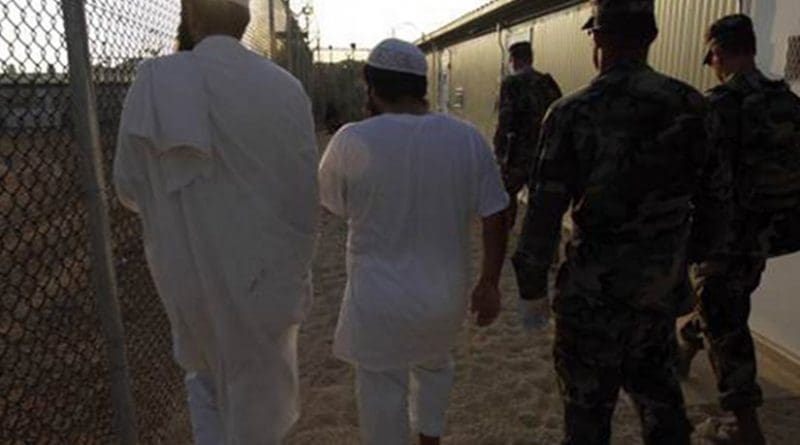Read The Center For Constitutional Rights’ “Faces Of Guantánamo” Reports – OpEd
In December, I was privileged to work with the New York-based Center for Constitutional Rights on three reports about Guantánamo that were published to mark the 10th anniversary of the opening of the prison on January 11, 2012, and released at a press conference in Washington D.C. that I reported here. The three reports are entitled, “Faces of Guantánamo: Resettlement,” “Faces of Guantánamo: Indefinite Detention,” and “Faces of Guantánamo: Torture” (also available via this page) and they present a comprehensive analysis of Guantánamo’s history, President Obama’s failure to close the prison as he promised, and profiles of 20 of the 171 prisoners still held.
The first report, “Faces of Guantánamo: Resettlement,” focuses on the 89 prisoners still held who were cleared for release by President Obama’s Guantánamo Review Task Force, but who are still held either because they cannot be safely repatriated, and no country has volunteered to offer them a new home, or because they are Yemenis, and both the President and Congress have acted to prevent the release of any cleared Yemeni prisoners, even though this constitutes guilt by nationality, which is an indefensible generalization, and ought to be regarded as a profound shame.
The article explains in detail President Obama’s failures, including his refusal to allow any innocent prisoners (the Uighurs, Muslims from China’s Xinjiang province) to be settled in the US, and also describes how Congress has intervened to prevent the release of prisoners for nakedly political reasons. Included are recommendations for the Obama administration, and calls for other countries to help with the resettlement of those who cannot be safely repatriated.
There are also profiles of the following prisoners in need of new homes: Ahmed Ajam (a Syrian), Djamel Ameziane (an Algerian), Ahmed Belbacha (another Algerian), Ali Hussein al-Shaaban (another Syrian), Mohammed Tahamuttan (a Palestinian), Ravil Mingazov (a Russian), and Umar Abdulayev (a Tajik).
The second report, “Faces of Guantánamo: Indefinite Detention,” condemns President Obama for his decision to endorse indefinite detention without charge or trial for 46 of the remaining prisoners, on the spurious basis that they are too dangerous to release, even though there is insufficient evidence for them to be put on trial. As the report notes, “accepting indefinite detention crosses America over a dangerous Rubicon: permitting government officials to predict an individual’s future dangerousness through secret, untestable and potentially illegitimate criteria is incompatible with the most elementary principles permeating this country’s constitutional tradition.”
This second report also focuses on the unacceptable interference by the judges of the D.C. Circuit Court, who have been responsible for gutting habeas corpus of all meaning when it comes to the Guantánamo prisoners, by whittling away, for purely ideological reasons, at the detention standards agreed by the lower court judges making reasoned decisions about the prisoners’ habeas corpus petitions.
Also included is further criticism of Congress and, in particular, the provisions included in the National Defense Authorization Act, making it mandatory for terror suspects to be held in military custody without charge or trial, and also reiterating the restrictions on the release of Guantánamo prisoners that have actually been a feature of Congressional legislation for the last year, and have been largely responsible for the fact that no living prisoner has been released from Guantánamo since January 2011.
The report also features profiles of the following prisoners: Adnan Farhan Abdul Latif, Abdul Rahman al-Qyati, Ghaleb al-Bihani, Mohammed al-Adahi, Musa’ab al-Madhwani and Saeed Hatim (all Yemenis).
The third report, “Faces of Guantánamo: Torture,” examines how President Bush came to bypass the UN Convention Against Torture, and the US torture statute, even though the UN Convention, ratified by the US in 1987, explicitly states, “No exceptional circumstances whatsoever, whether a state of war, or a threat of war, internal political instability or any other public emergency, may be invoked as a justification for torture.”
The article covers the notorious military order of November 2001, establishing the military commissions, the internal memos dealing with the Geneva Conventions, which led to President Bush depriving the prisoners in his “war on terror” of the protections of the Geneva Conventions, including Common Article 3, which protects prisoners from torture or ill-treatment, and the subsequent establishment of an official torture program, with a justification provided by lawyers, close to former Vice President Dick Cheney, who cynically attempted to redefine torture.
The article also examines how former defense secretary Donald Rumsfeld introduced torture at Guantánamo, and how the open-ended detention to which those still held are subjected is itself a form of torture.
Also included are profiles of the following prisoners: Abu Zubaydah — and other “high-value detainees,” Ahmed al-Darbi (a Saudi), Mohamedou Ould Slahi (a Mauritanian), Mohammed al-Qahtani (another Saudi), Sanad al-Kazimi (a Yemeni), Shaker Aamer (the last British resident in Guantánamo) and Sharqawi Ali al-Hajj (another Yemeni).
Note: Please visit the website of the “Close Guantánamo” campaign, and sign up to join a growing body of people demanding that President Obama fulfill his unfulfilled promise to close the prison. Please also sign a new White House petition on the “We the People” website calling for the closure of Guantánamo. 25,000 signatures are needed by February 6.

